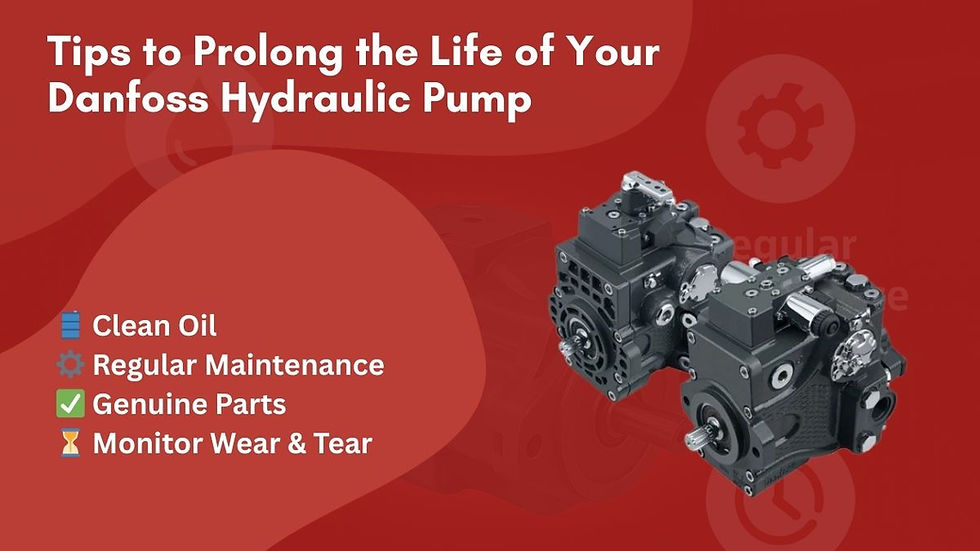Hydraulic Pump Repair vs Replacement: Which Option is Right for You?
- excellenthydraulic
- Jul 8, 2025
- 3 min read

Hydraulic pumps serve as the primary component in numerous industrial, construction, and agricultural systems. When they fail or underperform, your operation could come to a standstill. That leaves you with a crucial decision. Should you repair the pump or replace it completely?
The right choice is not always straightforward, and the decision depends on factors like the affected damage area, cost, downtime tolerance, depreciation value and long-term goals. In this blog post, you will find out the pros and cons of each option to help you make an informed decision.
When to Repair Your Hydraulic Pump
Repairing your hydraulic pump can be a smart and cost-effective solution only if the damage is manageable and the pump has not been completely deteriorated.
Hydraulic Repair is suitable for:
Minor issues such as worn seals, bearings, thrust plate, broken hydraulic piston pumps, minor scratches or damaged valves.
Pumps giving low to moderate operational hours.
Scenarios where downtime must be minimised.
If aftermarket parts are available for older parts.
Why Repairing the Pump Can Still Work
Repairing a pump often saves more money. In many cases, it can cost nearly half of what you would spend on a new one.
If the needed parts are nearby, the repair can be done quickly. It gets your system back without much delay.
The setup also stays the same. No changes are needed, and your team can carry on with what they already know.
We promise that a well-done repair feels smooth and saves both time and effort in the short run.
A Few Things to Consider
Repaired pumps may not last as long. They work fine for a while, but they are not built for the long journey.
If the problem is not fully solved, it can come back again. Worn parts or weak spots may keep causing trouble.
Some damage is just too much, such as in Hydraulic Construction Equipment. In such cases, even a repair will not bring back full strength.
When to Replace Your Hydraulic Pump
In some cases, replacement is the only logical move, especially when safety, reliability, and long-term performance are non-negotiable.
Suitable for:
Huge damage, such as cracked housing or shaft misalignment.
Outdated or unsupported pump models.
High-hour pumps near the end of their service life.
Critical applications where failure is not an option.
Why Replacing an Old Pump is a Smart Move
New pumps are less likely to stop working without warning. This means your work keeps going, and you do not spend extra on sudden repairs.
Most new models match well with modern machines. They are made to fit easily with updated systems and tools.
New pumps also come with better safety features. They have features that help stop accidents and protect your equipment.
If you take care of them, a new pump can last for many years.
Some newer models allow you to monitor things such as pressure and temperature in real-time. Monitoring your build-up will allow you to keep an eye on things and mitigate future problems.
New pumps are also more energy-efficient. The amount you save adds up over time!
A Few Things to Keep in Mind
Buying a new pump does cost more in the beginning. It may feel like a big step compared to just getting a repair done.
Sometimes you may need to wait longer for the new model to arrive. It depends on the type you choose and the supplier.
Some new pumps may not fit in right away. You might have to adjust your system or guide your team on how to use it.
Even with these things, the value of long-term peace and smooth work often makes it worth it.
We promise that if you look at the bigger picture, this choice brings more trust and fewer troubles down the road.
Questions to Ask Before Deciding
To simplify the decision-making process, ask yourself these key questions:
What is the magnitude of the damage?
Is downtime a major concern?
Are parts available for your current pump?
What is the cost difference between repair and replacement?
How critical is this pump to your operation's success?
The Bottom Line: Repair vs. Replacement
Situation | Recommended Option |
Minor wear | Repair |
Major internal/external damage, | Replacement |
The pump is obsolete or unsupported | Replacement |
Quick fix needed, and parts are in stock. | Repair |
Downtime is critical, and failure is unacceptable. | Replacement |
Final Thoughts
When evaluating hydraulic pump repair vs. replacement, there is no one-size-fits-all answer. Repair may offer short-term savings and quicker fixes, while replacement can provide long-term reliability and performance.
Still unsure? A professional inspection and cost analysis can help you confidently choose the best path forward. If still confused about picking the right decision, contact our expert for Industrial hydraulic pump repairing service.




Comments